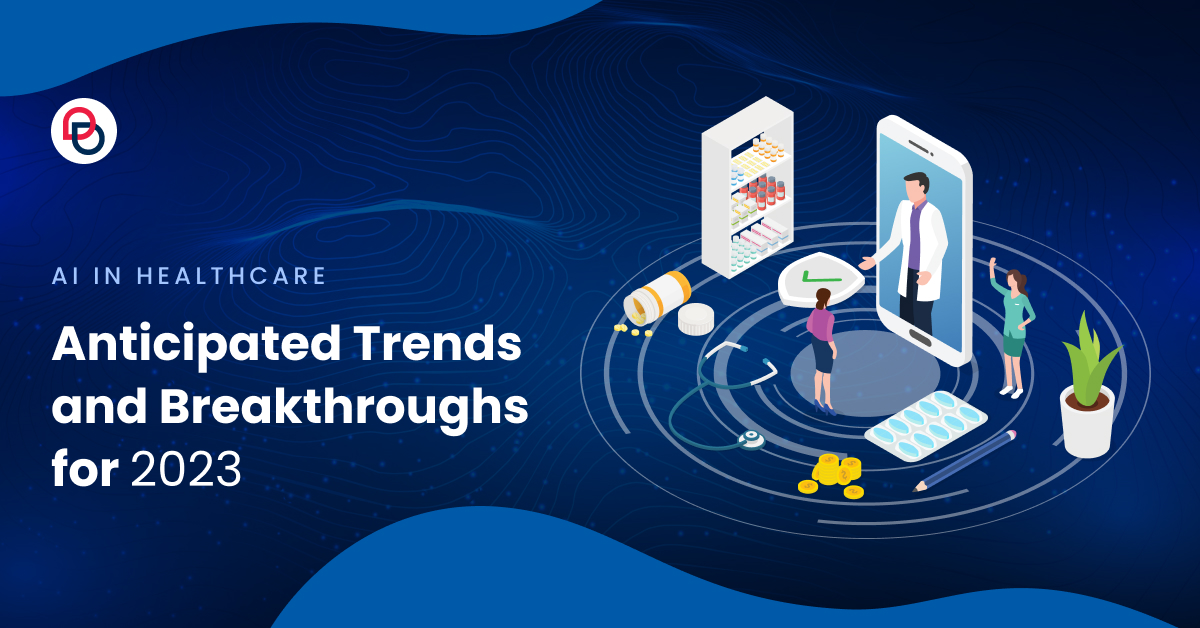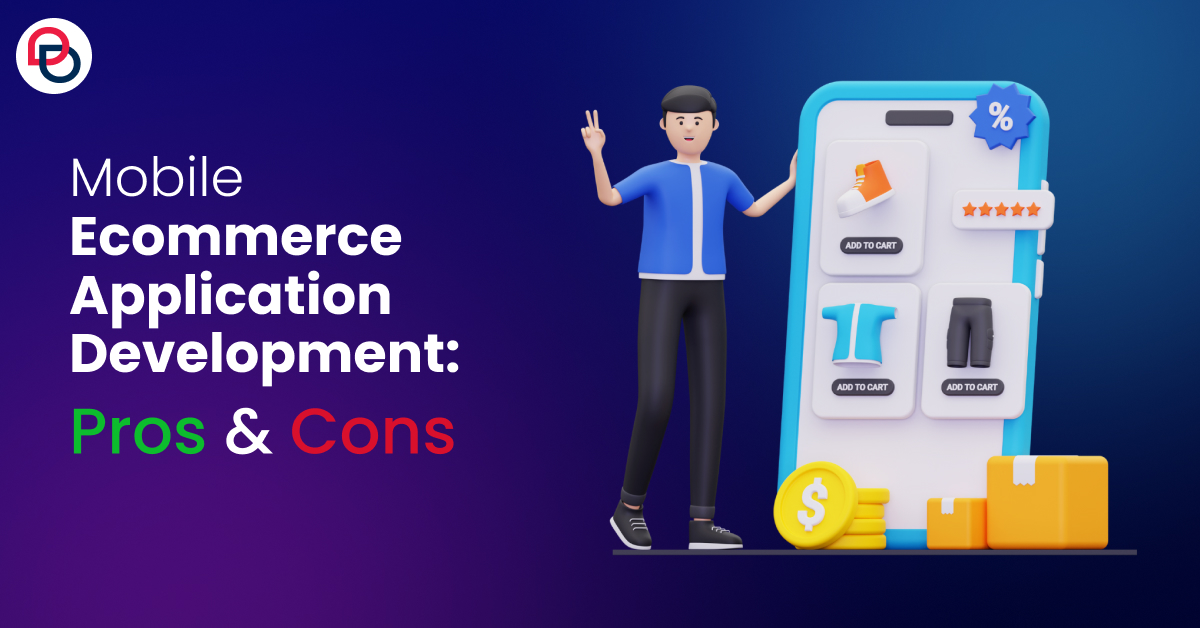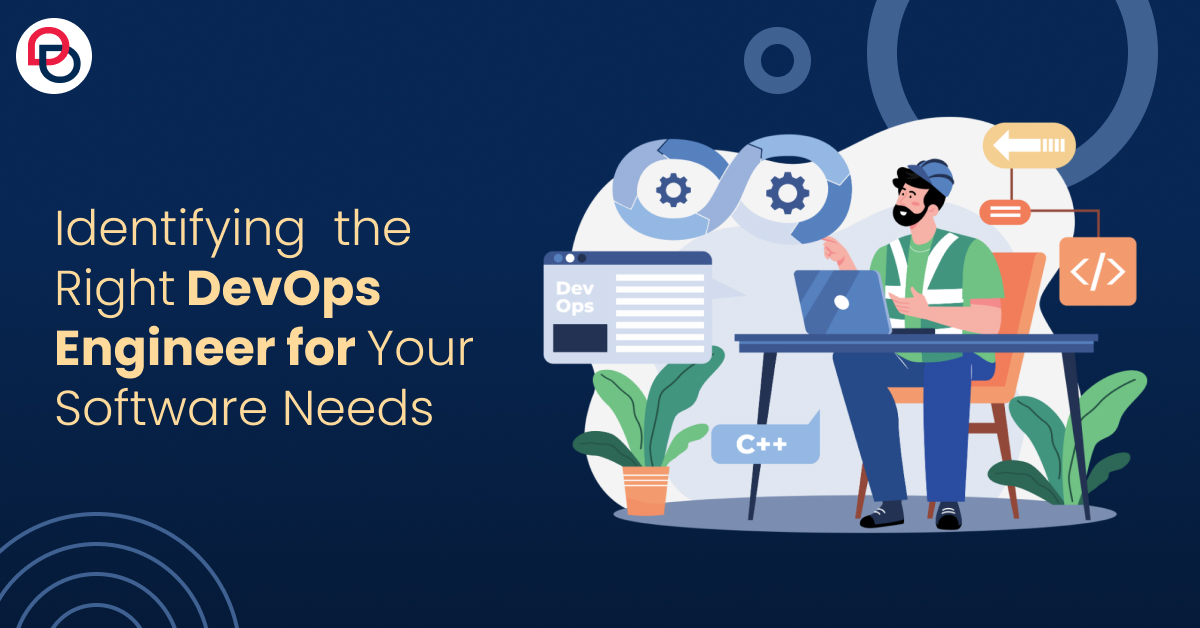AI in Healthcare: Anticipated Trends and Breakthroughs for 2023
Healthcare may lag behind other industries in embracing artificial intelligence (AI). However, AI in healthcare is the most effective ground where it can truly demonstrate its worth across many dimensions. It can introduce greater responsiveness and productivity into the healthcare sector besieged by financial constraints, regulations, and paperwork while improving outcomes in critical life scenarios.
So, what is the size of the artificial intelligence in healthcare market? The artificial intelligence (AI) in the healthcare market will be approximately 11 billion US dollars by 2021. The worldwide healthcare AI industry is expected to grow by around 191 billion US dollars by 2030, growing at a CAGR of 36.9% between 2022 and 2030.
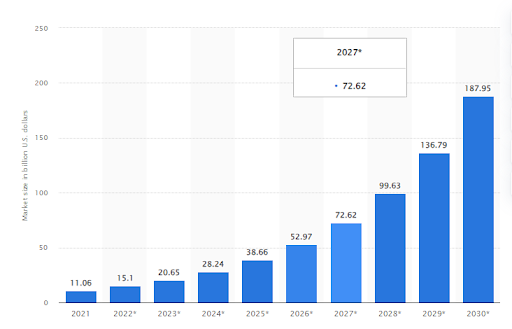
Source: Global AI Healthcare Market/ Statista
AI in healthcare trends revolutionizing the healthcare industry
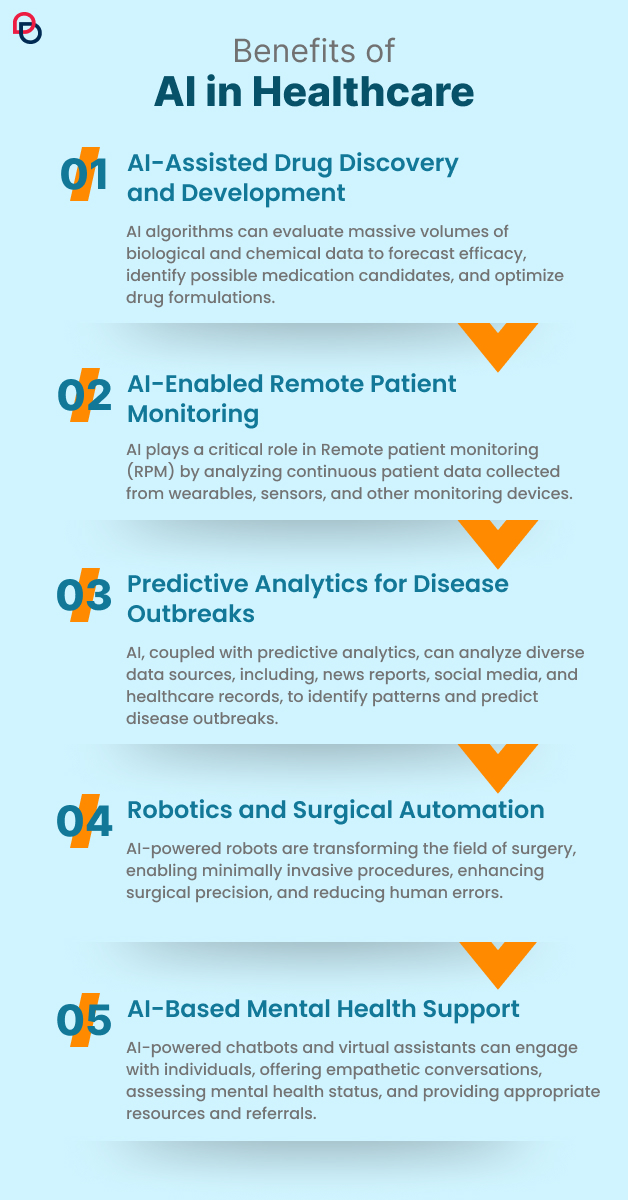
Artificial Intelligence in healthcare sector can enhance care delivery, accelerate better patient outcomes and decrease the administrative burden.
Let’s explore the AI trends embraced by healthcare organizations.
- Precision Medicine and Personalized Treatments
AI in health sector is helping to advance precision medicine, which attempts to give individualized treatments concerning unique patient characteristics. AI analyses enormous volumes of patient data, including medical history, genetic information, and lifestyle factors, using machine learning and modern algorithms techniques to generate personalized treatment regimens. This method results in fewer unpleasant responses, more effective therapies, and better patient outcomes.
- AI-Driven Radiology
Artificial intelligence in medical diagnosis is changing today’s treatment approaches. For example, radiology is experiencing a significant transformation with the integration of AI. Deep learning algorithms are being trained on massive datasets to aid radiologists in interpreting medical images more accurately and efficiently. AI-powered tools can detect abnormalities, highlight potential areas of concern, and even predict disease progression. By augmenting radiologists’ expertise, AI enhances diagnostic accuracy, speeds up the interpretation process, and improves patient care.
- Natural Language Processing for Electronic Health Records
Electronic Health Records (EHRs) contain a wealth of valuable patient information, but extracting and utilizing this data efficiently has been a challenge. AI-powered natural language processing (NLP) techniques enable the automatic extraction and analysis of information from unstructured EHRs. It is one of the significant examples of AI in medical field. This technology facilitates clinical decision support, enables risk prediction, and enhances the overall quality of care by providing healthcare providers with relevant patient insights.
- Virtual Assistants and Chatbots
If you are asked how artificial intelligence and healthcare are connected, look at the chatbots you encounter when you visit a healthcare website. Virtual assistants and chatbots are transforming the way patients and healthcare professionals interact. These AI-powered systems can engage in conversational exchanges, answer patient queries, schedule appointments, provide medication reminders, and offer general health advice. By automating routine tasks, virtual assistants and chatbots improve efficiency, reduce administrative burdens, and enhance patient satisfaction.
- AI-Enabled Remote Patient Monitoring
Remote patient monitoring (RPM) has gained momentum, especially with the COVID-19 pandemic emphasizing the need for remote healthcare services. AI in healthcare plays a critical role in RPM by analyzing continuous patient data collected from wearables, sensors, and other monitoring devices. Through AI algorithms, healthcare providers can identify trends, detect early warning signs, and intervene proactively, thereby reducing hospital readmissions and improving patient care in non-acute settings.
- AI-Assisted Drug Discovery and Development
The medication discovery and development process is costly, time-consuming, and frequently unsuccessful. However, artificial intelligence in medical field is streamlining and speeding up the process. AI algorithms can evaluate massive volumes of biological and chemical data to forecast efficacy, identify possible medication candidates, and optimize drug formulations. This AI-driven strategy holds the possibility of more efficient and cost-effective drug discovery, resulting in the delivery of innovative medicines and better patient outcomes.
- Robotics and Surgical Automation
AI-powered robots are transforming the field of surgery, enabling minimally invasive procedures, enhancing surgical precision, and reducing human errors. With the use of AI in healthcare, surgeons can leverage robotic systems for complex surgeries, benefiting from improved visualization, enhanced dexterity, and increased control. Additionally, AI algorithms can assist in intra-operative decision-making, pre-operative planning, and post-operative monitoring, further improving surgical outcomes.
- Predictive Analytics for Disease Outbreaks
Early detection and timely response are critical in managing disease outbreaks. The use of AI in medicine, coupled with predictive analytics, can analyze diverse data sources, including, news reports, social media, and healthcare records, to identify patterns and predict disease outbreaks. This information enables public health agencies to allocate resources efficiently, mitigate the spread of infectious diseases and implement preventive measures.
- AI-Based Mental Health Support
Mental health disorders are on the rise globally, and AI is proving to be a valuable tool in providing support and care. AI in healthcare, powered by chatbots and virtual assistants can engage with individuals, offering empathetic conversations, assessing mental health status, and providing appropriate resources and referrals. AI-driven mental health apps can track behavior patterns, identify potential crises, and deliver personalized interventions, thereby expanding access to mental health services.
- Ethical and Regulatory Considerations
As AI continues to advance in healthcare, ethical and regulatory considerations become increasingly important. Issues such as data privacy, transparency, bias, and accountability need to be addressed to ensure the responsible and equitable use of AI in healthcare. Regulatory frameworks and guidelines must be updated and developed to keep pace with AI innovations while safeguarding patient rights and ensuring ethical AI deployment.
Wrapping Up
AI in healthcare is reshaping medical domain in profound ways, ushering in a new era of precision medicine, improved diagnostics, and enhanced patient care. The top 10 AI trends in healthcare for 2023 highlight the potential of AI to revolutionize various aspects of healthcare delivery, including precision medicine, radiology, EHR analysis, virtual assistants, remote patient monitoring, and others.
As AI technologies continue to evolve and mature, we can expect further transformative advancements in healthcare, benefiting patients, healthcare professionals, and society as a whole. Try to bring the latest AI trends to your healthcare units today!

